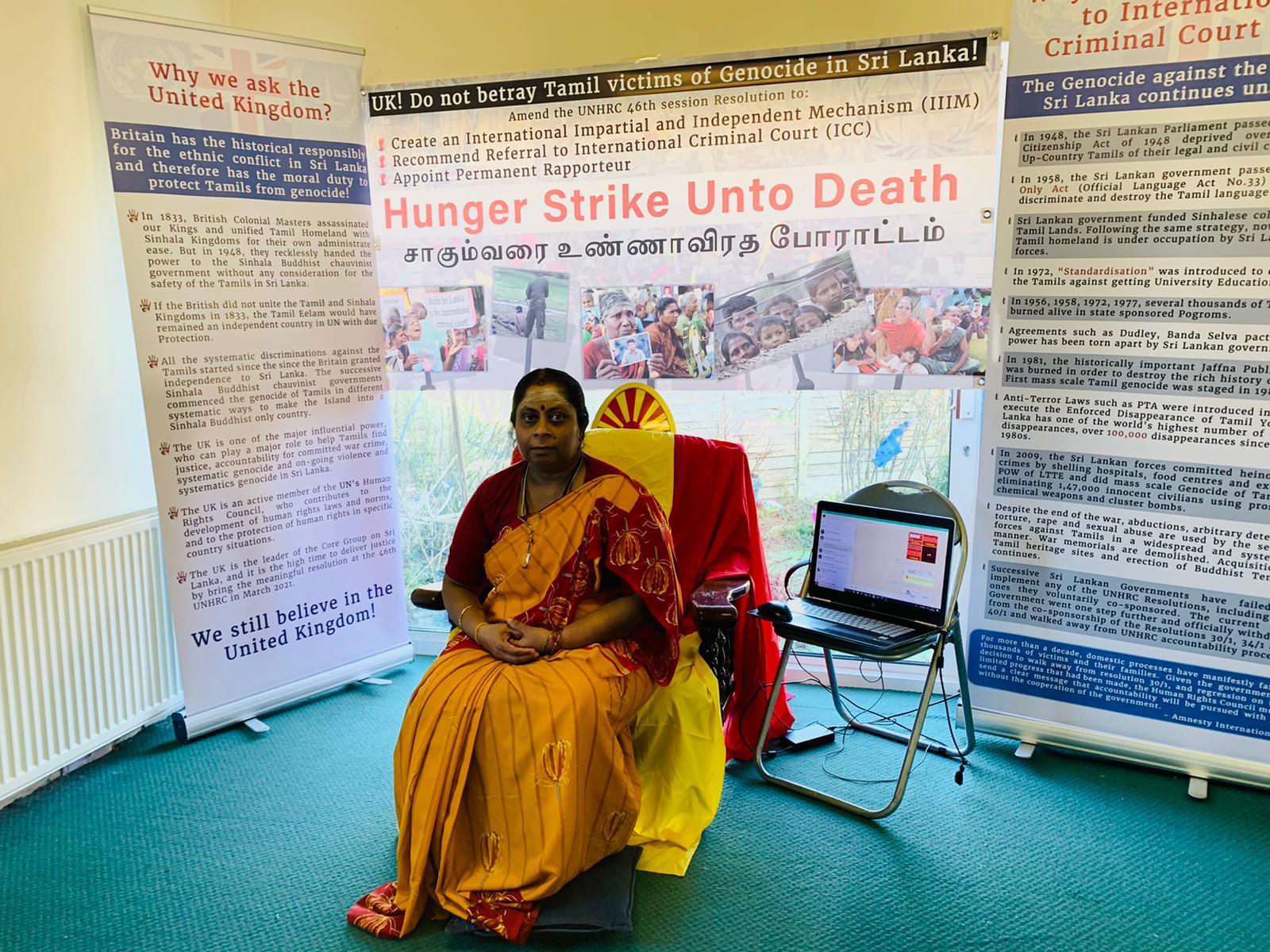Ambihai K Selvakumar, a director of the International Centre for the Prevention of Genocide (ICPPG) is in the second day of her hunger strike, as she continues her demand that the UK refer Sri Lanka to the International Criminal Court.
This hunger strike comes as the UN Human Rights Council convened for the 46th session in Geneva at the start of this week. During deliberations, UN High Commissioner for Human Rights, Michelle Bachelet outlined her damning report on Sri Lanka which not only highlighted Sri Lanka’s unwillingness to address issues of accountability but also warned that the deterioration of human rights heightened the risk of further violations. Britain’s representative, Minister of State for South Asia and the Commonwealth, Lord Ahmad, commended the high commissioner's detailed report and further criticised ongoing impunity in Sri Lanka, noting that “previous domestic commissions have all failed”.

In their statement the ICPPG sharply criticises Sri Lanka’s disregard for accountability noting their withdrawal from the previous cosponsored UN resolution as well as highlighting the High Commissioner’s report which detailed “deeply entrenched barriers to justice in the domestic criminal justice system, particularly for international crimes”. They also note that senior military officials accused of war crimes have been rewarded for their service and appointed to high-ranking government positions.
The statement also noted the increasing Sinhalisation of the North-East as well as the destruction of Tamil heritage sites and monuments. They also highlighted reporting from Journalist for Democracy in Sri Lanka (JDS) which reported 50 abductions within 26 months. These abductions occurred from 2016 till the first half of 2018 with most victims being reported as Tamils.
In her statement, Selvakumar maintains that she will not break her fast until one of the following demands are met:
- Recommend to the UN Security Council and the UN General Assembly that Sri Lanka be referred to the International Criminal Court and take steps to effectively investigate charges of war crimes, crimes against humanity, and genocide.
- Establish an International Independent Investigative Mechanism (IIIM), akin to those established for Syria and Myanmar, which mandates the evidence is of international crimes and human rights violations be collected and prepared for criminal prosecutions. A meaningful IIIM must have a strict time frame.
- Mandate that the Office of the High Commissioner for Human Rights (OHCHR) appoint a Special Rapporteur to continue to monitor Sri Lanka for on-going violations and have an OHCHR field presence in Sri Lanka.
- Recommend an UN-monitored Referendum to determine the aspirations of the Tamil people in Sri Lanka, on the basis that the North-East of Sri Lanka is the traditional Tamil homeland and the Tamils have the right to self-determination.
The demands put forwards by the ICPPG comes as there are increasing calls for the UK to take decisive action. In January over 250 British Tamil organisations called on the government to establish an IIIM to investigate Sri Lanka war crimes and the charge of genocide. That same month in an unprecedented act of unity major Tamil political leaders, Tamil civil society actors and Tamil victim community representatives have signed a statement calling for an international accountability process, including a referral to the International Criminal Court (ICC). This month thousands of Tamils and Muslims across the North-East engage in mass demonstrations calling for the international community to take action on Sri Lanka. Families of the Disappeared have also conducted a protest making similar demands.
Over 75 parents of the FOD have passed away in the Tamil Homeland since they began their protests in February 2017.
A hunger strike urging the Sri Lankan government to be brought before the International Criminal Court (ICC) also commenced in Nallur, Jaffna today morning, with Jaffna and Eastern University students among those taking part.
Read ICPPG's statement here.
Read Selvakumar's statement here.
We need your support
Sri Lanka is one of the most dangerous places in the world to be a journalist. Tamil journalists are particularly at threat, with at least 41 media workers known to have been killed by the Sri Lankan state or its paramilitaries during and after the armed conflict.
Despite the risks, our team on the ground remain committed to providing detailed and accurate reporting of developments in the Tamil homeland, across the island and around the world, as well as providing expert analysis and insight from the Tamil point of view
We need your support in keeping our journalism going. Support our work today.
For more ways to donate visit https://donate.tamilguardian.com.

